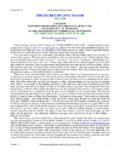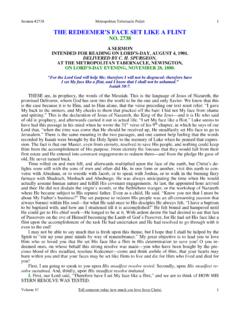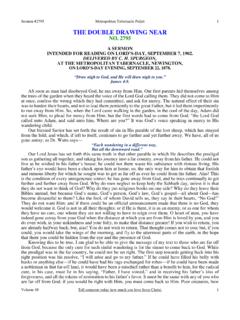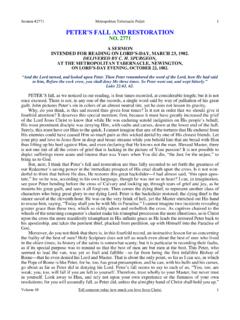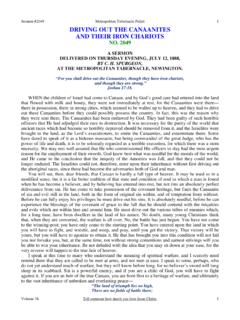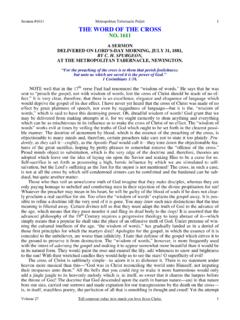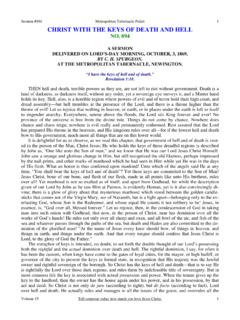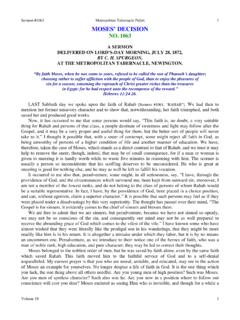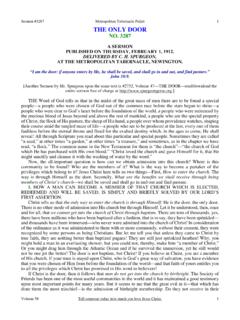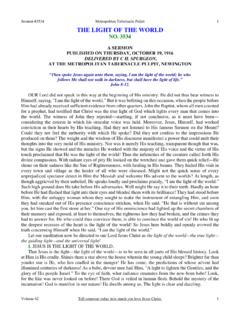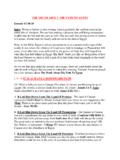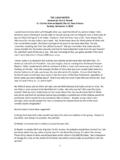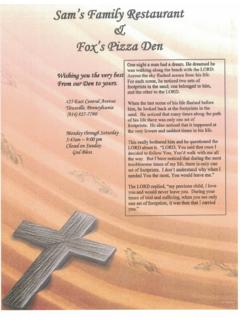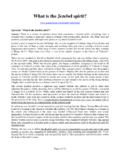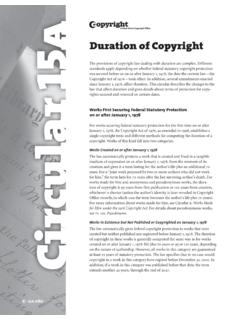Transcription of Sermon #2803 Metropolitan Tabernacle Pulpit 1
1 Sermon #2803 Metropolitan Tabernacle Pulpit 1. THE saddest CRY FROM THE cross . NO. 2803. A Sermon . INTENDED FOR READING ON LORD'S-DAY, NOVEMBER 2, 1902. DELIVERED BY C. H. SPURGEON, AT THE Metropolitan Tabernacle , NEWINGTON, ON LORD'S-DAY EVENING, JANUARY 7, 1877. And about the ninth hour Jesus cried with a loud voice, saying, Eli, Eli, lama Sabachthani? That is to say, My God, My God, why have You forsaken Me.. Matthew 27:46. DURING the time that Moses kept the flock of Jethro, his father-in-law, he came to the mountain of God, even to Horeb, and there he saw a strange sight a bush that burned with fire, and yet was not consumed. Then Moses, apparently overtaken by curiosity, was drawing near, in order to examine this phenomenon, when he heard God's voice say to him, Draw not near here: put off your shoes from off your feet, for the place where on you stand is holy ground.
2 We also may well feel, as we think of our Lord Jesus in His agony, that the voice of God speaks to us from the cross , and says, Curiosity bold, daring, prying intellect draw not near here; put off your shoes from off your feet, for the place where on you stand is the very Holy of Holies, unto which no man may come except as the Spirit of God shall conduct him here.. I think I can understand the words, My God, my God, why have You forsaken me? as they are written by David in the 22nd Psalm; but the same words, My God, My God, why have You forsaken Me? . when uttered by Jesus on the cross , I cannot comprehend, so I shall not pretend to be able to explain them. There is no plummet that can fathom this deep; there is no eagle's eye that can penetrate the mystery that surrounds this strange question.
3 I have read that once upon a time, Martin Luther sat down in his study to consider this text. Hour after hour, that mighty man of God sat still; and those who waited on him came into the room, again and again, and he was so absorbed in his meditation that they almost thought he was a corpse. He moved neither hand nor foot, and neither ate nor drank; but sat with his eyes wide open, like one in a trance, thinking over these wondrous words, My God, My God, why have You forsaken Me? . And when, after many long hours, in which he seemed to be utterly lost to everything that went on around him, he rose from his chair, someone heard him say, God forsaking God! No man can understand that; . and so he went his way. Though that is hardly the correct expression to use I should hesitate to endorse it yet I do not marvel that our text presented itself to the mind of Luther in that light.
4 It is said that he looked like a man who had been down a deep mine, and who had come up again to the light. I feel more like one who has not been down the mine, but who has looked into it or like one who has been part of the way down, and shuddered as he passed through the murky darkness, but who would not dare to go much lower, for this cry, Eli, Eli, lama Sabachthani? is a tremendous deep; no man will ever be able to fathom it. So I am not going to try to explain it; but, first, to utter some thoughts about it; and then, secondly, to draw some lessons from it. We may find many practical uses for things which are beyond the grasp of our minds, and this saying of our Lord may be of great service to us even though we cannot comprehend it. I. First, then, let me utter SOME THOUGHTS ABOUT THIS STRANGE QUESTION: My God, My God, why have You forsaken Me?
5 Jesus was accustomed to address God as His Father. If you turn to His many prayers, you will find Him almost invariably if not invariably speaking to God as His Father. And, truly, He stands in that relationship both as God and as man. Yet, in this instance, He does not say, Father; but My God, My God. Was it that He had any doubt about His Sonship? Assuredly not; Satan had assailed Him in the wilderness with the insinuation, If You are the Son of God, but Christ had put him to the rout; and I feel persuaded that Satan had not gained any advantage over Him, even on the cross , which could have made Him doubt whether He was the Son of God or not. Volume 48 Tell someone today how much you love Jesus Christ. 1. 2 The saddest Cry from the cross Sermon #2803. I think that our Savior was then speaking as man, and that this is the reason why He cried, My God, My God, rather than My Father.
6 I think He must have been speaking as man; as I can scarcely bring my mind to the point of conceiving that God the Son could say to God the Father, My God, My God.. There is such a wonderful blending of the human and the Divine in the person of the Lord Jesus Christ that, though it may not be absolutely accurate to ascribe to the Deity some things in the life of Christ, yet is He so completely God and man that, often, Scripture does speak of things that must belong to the humanity only as if they belonged to the Godhead. For instance, in his charge to the Ephesian elders, the apostle Paul said, Feed the church of God, which He has purchased with His own blood an incorrect expression, if judged according to the rule of the logician; but accurate enough according to the Scriptural method of using words in their proper sense.
7 Yet I do think that we must draw a distinction between the Divinity and the humanity here. As the Lord Jesus said, My God, My God, it was because it was His humanity that was mainly to be considered just then. And O my brethren, does it not show us what a real man the Christ of God was, that He could be forsaken of His God? We might have supposed that Christ being Emmanuel God with us the Godhead and the manhood being indissolubly united in one person, it would have been impossible for Him to be forsaken of God. We might also have inferred, for the same reason, that it would have been impossible for Him to have been scourged, and spit upon, and especially that it would not have been possible for Him to die. Yet all these things were made not only possible, but also sacredly certain.
8 In order to complete the redemption of His chosen people, it was necessary for Him to be both God's well-beloved Son, and to be forsaken of His Father; He could truly say, as His saints also have sometimes had to say, My God, My God, why have You forsaken Me? Persecuted and forsaken believer, behold your Brother in adversity! Behold the One who has gone wherever you may have to go, who has suffered more than you can ever suffer, and who has taken His part in the direst calamity that ever happened to human nature, so that He had to cry out, in the agony of His soul, My God, My God, why have You forsaken Me? . What was this forsaking? We are trying to come a little closer to this burning yet unconsumed bush . with our shoes off our feet, I hope, all the while and in this spirit we ask, What was this forsaking?
9 A. devout writer says that it was horror at the sight of human misery. He affirms, what is quite true, that our Lord Jesus Christ saw all that man had to suffer because of sin; that He perceived the total sum of the miseries brought by sin upon all the past, present, and future generations of the human race and that He must have had a holy horror as He thought of all the woes of man, caused by sin, in this life, and in that which is to come and being completely one with man, He spoke in the name of man, and said, My God, My God, why have You forsaken Me? That is all true, yet that explanation will not suffice, my brethren;. because our Savior did not say, My God, My God, why have You forsaken man? but, Why have You forsaken Me? This forsaking was something personal to Himself.
10 Others have said that it was a dreadful shrinking in His soul on account of human sin. I have read of a child, who had done wrong, and whose father had faithfully rebuked and punished him; but the boy remained callous and sullen. He sat in the same room with his father, yet he refused to confess that he had done wrong. At last, the father, under a sense of his child's great wickedness, burst into tears, and sobbed and sighed. Then the boy came to his father, and asked him why he sorrowed so, and he answered, Be- cause of my child's hardness of heart. It is true that our Lord Jesus Christ did feel as that father felt; only far more acutely; but our text cannot be fully explained by any such illustration as that; that would be only explaining it away, for Christ did not say, My God, My God, why has man forsaken You, and why have You so completely left men in their sin?
